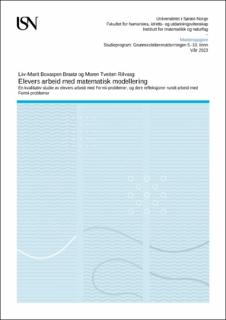Elevers arbeid med matematisk modellering
Master thesis
Permanent lenke
https://hdl.handle.net/11250/3080541Utgivelsesdato
2023Metadata
Vis full innførselSamlinger
Sammendrag
Nøkkelord: matematisk modellering, Fermi-problemer, LK20, estimering, sosial læring
Formålet med denne masteroppgaven er å få innsikt i elevers arbeid med matematisk modellering samt deres refleksjoner rundt å arbeide på denne måten. Matematisk modellering sees på som å bruke matematikken for å løse et problem fra virkeligheten. Det står sterkt i den gjeldende læreplanen (LK20) og det gjøres omfattende internasjonal forskning på temaet, i tillegg vi ønsket å lære mer om temaet. Vi ønsket å bruke en type modelleringsoppgaver kalt Fermi-problemer som fra forskningsfeltet understrekes som en passende inngang til matematisk modellering. For å avgrense oppgaven har vi benyttet oss av tre forskningsspørsmål som etterspør hvordan elevene arbeidet, hvilke eventuelle utfordringer som oppstår og hva elevenes refleksjoner rundt arbeid med Fermi-problemer er. Vi gjorde en kvalitativ studie og benyttet metodene deltagende observasjon, og deretter fokusgruppeintervjuer. Teori og tidligere forskning som hjalp oss å analysere og diskutere funnene er hovedsakelig litteratur som omhandler sosiokulturell læringsteori, modellering, Fermi-problemer og samt andre relevante begreper som oppgaveparadigme og undersøkelseslandskap. Delene av datamaterialet er analysert ulikt. Data fra observasjon er kodet etter operasjonaliseringen av Blum og Leiß (2007) og data fra intervjuer har gjennomgått en tematisk analyse inspirert av Braun og Clark (2006). Analysene av funn ble ved hjelp fra teori og tidligere forskning diskutert. Det første aspektet som ble diskutert er hvordan Fermi-problemer, på bakgrunn av ulike årsaker kan fungere som inngang til modellering. Videre diskuteres det hvordan Fermi-problemer bidrar til utviklingen av flere matematiske kompetanser. Det påfølgende delkapitlet omhandler elevenes beskrivelser av å arbeide med Fermi-problemer. Til slutt fremheves elevenes egne refleksjoner rundt samarbeid og samarbeidets innvirkning på arbeid med Fermi-problemer. Underveis redegjøres et også for eventuelle utfordringer som kan oppstå i slikt arbeid. Masteroppgaven konkluderes til slutt ved å oppfordre lærere til å implementere Fermi-problemer som en inngang til matematisk modellering. Keywords: mathematical modelling, Fermi problems, LK20, estimating, social learning
The purpose of this master thesis er to gain insight into pupils’ work with mathematical modelling and their reflections on working in this manner. Mathematical modelling is seen as a way to use mathematics to solve a real-world problem. It is emphasized in the current curriculum (LK20) and extensive international research is being conducted in mathematical modelling. Additionally, we had personal motivation to learn more about the topic. We wanted to use a type of modelling task called Fermi problems which is being emphasized by the research field as a suitable gateway into mathematical modelling. To narrow down the thesis, we used three research questions that ask how pupils work with mathematical modelling, which challenges arise during this kind of work, and what the pupils’ reflections of such tasks are. We conducted a qualitative study with the methods: participatory observation and group interviews. Theory and former research which helped us analyze and discuss our results mainly consisted of literature on sociocultural learning theory, modelling, Fermi problems and other relevant terms such as landscape of investigation and exercise paradigm. The parts of the data material were analyzed differently due to its different nature. Data from observations was coded according to the operationalization by Blum and Leiß (2007), and data from interviews underwent a thematic analysis inspired by Braun and Clark (2006). The results were later discussed with the help of theory and former research. The first aspect discussed was how, for various reasons, Fermi problems can function as a gateway into mathematical modelling. Furthermore, it is discussed how Fermi problems contribute to the development of various mathematical competencies. The following subsection describes pupils’ descriptions of Fermi problems. Lastly, pupils’ reflections on collaboration and its impacts when working with Fermi problems are emphasized. The challenges that may arise during work with Fermi problems are described consecutively. The master thesis concludes by encouraging teachers to implement Fermi problems as a gateway into mathematical modelling.
